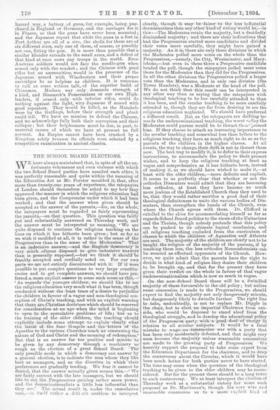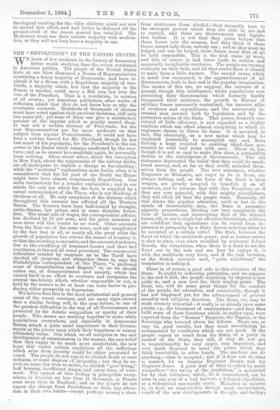THE SCHOOL BOARD ELECTIONS.
WE have always maintained that, in spite of all the un- fortunate vehemence and even violence with whiali the two School Board parties have assailed each other, it was perfectly reasonable and quite within the meaning of the Education Act as Mr. Forster moulded it, that, after more than twenty-one years of experience, the ratepayers of London should themselves be asked to say how they approved the manner in which the religious education had been given, and the Compromise under which it had been worked ; and that the answer when given should be accepted as the answer of the parents,—for, on the whole, the ratepayers must be regarded as fairly representing the parents,—on that question. This question was fairly put and substantially answered on Thursday week, and the answer must be interpreted as meaning, We are quite disposed to continue the religious teaching on the lines on which it has hitherto been given ; but so far as we wish it modified at all, it is rather in the sense of the Progressives than in the sense of the Moderates.' That is an indecisive answer,—and the English democracy is very much oftener disposed to give indecisive answers than is generally supposed,—but we think it should' be frankly accepted and cordially acted on. For our •own parts we are not entirely discontented with it. If it were possible to put complex questions to very large 'constitu encies and to get complete answers, we should have pre- ferred a more explicit answer in some such sense as thiae—," ' As regards the younger children, we should like to see the religious education very muchwhat it has been, though conducted without the least trace of welesire to prejudice the children in favour of a vague and nen-theological con- ception of Christ's teaching, and with an explicit warning that there are Christian doctrines which should be reserved for consideration atean age when the' wiled is beginning to open .to the speculative problems of life; but as to the training of the •elder children, the teaching should explicitly include some attempt to explain clearly what' the latest of the four Gospels and the letters of the Apostles to the various Churches teach us concerning the nature of God and Christ and the meaning of redemption.' But that is an answer far too positive and minute to be given by any democracy through a machinery 'so rough as the election of a great School Board. The only possible mode in which a democracy can answer by a general election, is to indicate the men whom they like best as managers, and so the direction in which their preferences are gradually tending. We fear it cannot be denied, that the answer actually given means this,—' We are fairly content with the late managers, but we should like to see the Progressives gaining rather more power, and the denominationalists a little less influential than they are.' The actual result is, under the cumulative vote,—in itself rather a diffi. ult problem to interpret clearly, though it may' be"fairer to the less influential denominations than any other kind of voting would be,—is this :—The Moderates retain the majority, but a decidedly, diminished majority; and there are clear indications that had the Progressives started more candidates and divided their votes more carefully, they might have gained a majority. As it is, there are only three divisions in which the Moderates polled more votes on the whole than the Progressives,—namely, the City, Westminster, and Mary- leboneee–but even in these three a Progressive candidate headed the poll, though the ratepayers polled more votes there for the Moderates than they did for the Progressives. In all the other divisions 'the Progressives polled a larger vote than the Moderates, and in only one division (the Tower Hamlets), was a Moderate at the head of the poll. We do not think that this result can be interpreted in any other way than as saying that the ratepayers wish theological teaching to be less carefully attended to than it has been, and the secular teaching to be more carefully attended to, though they are far from desiring to see the religious education neglected. We should have preferred a different result. But as the ratepayers are drifting to- wards the undenominational teaching, the worst reeliey the Moderates could pursue would be to thwart then rpresent bias. If they choose to attach an increasing importance to the secular teaching and somewhat less than before to the religious teaching, they have as much right to do so as the parents of the children in the higher classes. At all events, the way to change their drift is not to thwart them now. The best way to modify it, is to defer to their express instructions, to accommodate the policy to their present wishes, and to keep the religious teaching at least as vague and comprehensive as it has hitherto been, instead. of making it, as we should have wished to make it,—at least with the elder children,—more definite and explicit. It seems to us perfectly clear that -whether or not the orthodox Dissenters would admit that they are .becoming less orthodox, at least they have become so much more jealous of the Established Church than they used to be, that they would rather sacrifice a good deal of their theological definiteness to unite the various bodies of Dis- senters, than strengthen the hands of the Church, even where the Church agrees with them. Dr. Clifford is extolled to the skies for accommodating himself so far as regards School. Boardpolitics to the views ofthe Unitarians and the Theists, though nobody pretends that this policy can be pushed to its ultimate logical conclusion, and all religious teaching excluded from the curriculum of classes to which the children of Agnostics- and Atheists are sent. The majority of the children are clearly not to be taught the religion of the majority of the parents, if by teaching them lees, the less orthodox Nonconformists can be secured • as effectual opponents of the Church. How- ever, we quite admit that the parents have the right to decide in whatkincli of religion they desire their children to be brought up, and that for the present they have given their ,verdict on the whole in favour of that vague undenominationalisen which is now so much in vogue.
On the new School, Board there will be a dwindled majority of those favourable to the old policy ; but unless some concession is made to the Progressives, we should expect to find the majority not only dangerously minute, but dangerously likely to dwindle further. The right line to take, undoubtedly, is not to replace Mr. Diggle in the chair, but to elect an impartial Chairman from out- side, who would be disposed to stand aloof from the theological struggle, and to develop the educational policy of the Progressive party with a good deal. of energy ih relation to all secular subjects. It would be a fatal mistake to wageea.rt'intemseeine war with a party that has been only accidentally defeated, and that might very soon become the ,majority unless reasonable concessions are made to the growing party of Progressives. We heartily support the proposal to take some expert from the Education Department for the chairman, and to drop the controversy about the Circular, which it would have been much better for both parties never to have started. The time may come when the question of the theological teaching to be given to the elder children may be recon- sidered. But for the present there should be a long truce to such controversy. We at least interpret the election of Thursday week as a substantial victory for some such proposal as Dr. Martineau's, though his very wise and reasonable concession as to a more ixplicit hind of theological teaching for the elder children could not now be carried into effect, and had better be deferred till the ground-swell of the recent quarrel has subsided. The Moderates must use their minute majority with modera- tion, or they will not long have a majority to use.



















































 Previous page
Previous page